Virginia Crow's Blog: Crowvus Book Blog, page 27
September 21, 2022
#HistFicThursdays - The Old Dragon's Head - Justin Newland - Guest Post

It's #HistFicThursdays, and I'm so excited to be sharing a guest post from Justin Newland, as part of his Coffee Pot Book Club tour. Find out all about how China inspired Justin's fantastic book The Old Dragon's Head. But first, let's meet the book...
BlurbThe Great Wall of China may be constructed of stone and packed earth, but it is home to a supernatural beast – the Old Dragon. Both wall and dragon protect China’s northern borders from Mongol incursion. Just beyond the fortress of Shanhaiguan, the far eastern end of the wall protrudes into the Bohai Sea – that’s the Old Dragon’s Head.
Bolin, a young man working on the Old Dragon’s Head, suffers visions of ghosts. The local seer suspects that he has yin-yang eyes and other supernatural gifts. Bolin’s fief lord, the Prince of Yan, rebels against his nephew, the Jianwen Emperor. In the bitter war of succession, the Mongols hold the balance of power. While the victor might win the battle on earth, China’s Dragon Throne can only be earned with a Mandate from Heaven – and the support of the Old Dragon.
In every era, a man endowed with the powers of heaven – the Dragon Master – is born. Only he can summon the Old Dragon, providing he possesses the dragon pearl. It’s the year 1402, and neither the Old Dragon, the dragon pearl, nor the Dragon Master, has been seen for twenty years.
Bolin’s journey of self-discovery is mirrored by that of old China, as both endeavour to come of age. When Bolin accepts his destiny as the Dragon Master, heaven sends a third coming of age – for humanity itself. But are any of them ready for what is rising in the east?
The Old Dragon's Head is available at Amazon UK - Amazon US - Amazon CA - Amazon AU - Amazon India - Barnes and Noble - Waterstones - Kobo - Author’s Website (where buyers can enter a dedication to be signed by the author) - Blackwell’s (UK) - Bol (NL) - Books.Telegraph (UK) - Publisher’s Website - Saxo (DK) - Scribd
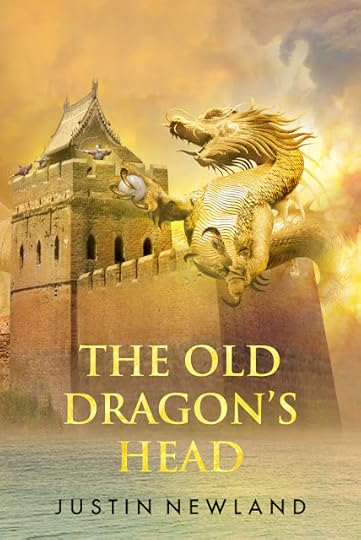
Guest Post
I have long been intrigued by the ancient land of China. The Old Dragon’s Head is the title of my second novel. It’s set during the Ming Dynasty, and the action plays out in the shadows of the Great Wall. It’s historical fiction, but with a supernatural twist, showing my two loves – history and the supernatural or the esoteric. China and Chinese history was a perfect place to find inspiration. And it did not disappoint.
The Old Dragon’s Head is a real place. The Great Wall of China is home to a supernatural beast – the Old Dragon. And just beyond the fortress of Shanhaiguan, the far eastern end of the wall protrudes into the Bohai Sea – that’s the Old Dragon’s Head.
 Map of Shanhaiguan Great Wall
Map of Shanhaiguan Great Wall
The fortress of Shanhaiguan, which means mountain-sea pass, was built by the Hongwu Emperor in 1380 to bridge the gap between the Yanshan Mountains and the Bohai Sea. That’s where the action of the novel takes place.
The novel is not only about physical walls and boundaries; it’s about meta-physical, psychological and supernatural ones and the endeavour of the people of China to build themselves a new future. If you look at China today, would you say they succeeded – or not?
Back in the 1400s, when the novel was set, the Chinese people had a deep-seated belief in demons, ghosts, and gods. Their overriding belief in the supernatural shot through the whole of their society, from Emperor to courtesan and from mandarin to beggar. This played perfectly into my love of the supernatural.
Then there’s the pervasive mystery of the Bagua, the mysterious eight trigrams of the I Ching, the famous Book of Divination.
There’s the Tao, and its enigmatic adherent, Lao Tzu. You might have seen him riding by on his ox. You may be familiar with the Yin-Yang symbol. I was curious too about the person who had Yin-Yang eyes, the name given to a seer or clairvoyant. I set out to write a character with this extraordinary vision. Her name was Luli.
 Image of Lao-Tzu on an ox.
Image of Lao-Tzu on an ox.
Then there’s the stoic wisdom of Mencius and Confucius and the considerable influence their writings had on Chinese ideas about society and the family and the respect within those entities.Into this exciting mix, you can put the religious beliefs of Buddhism and all their colourful and obscure ceremonies. The Chinese, like their European counterparts, controlled their people with a rigid and sometimes ruthless hand and had, at the same time, a remarkably modern tolerance for different religions. It was not unusual for debates involving Taoists, Buddhists, Christians, and Islamists to be conducted in the Emperor’s court.
The Chinese during the Ming Dynasty was almost obsessed with the need to appease the deities they believed ruled their lives. Nearly every person from wood gathered to the Emperor himself had to conform to the required practices – or suffer the consequences.
There were also subtle and essential differences between our western and Chinese notions of justice. For example, the Chinese believed that criminals had to admit to their crimes before they were taken to trial and sentencing. When you think about it, it makes good sense. If a person fails to admit to their offence, any punishment meted out to them will not work. Even worse, it could back-fire and engender resentment and revenge.
 Image of man in a cangue
Image of man in a cangue
They even invented the cangue, similar to the English or European idea of the stocks. The cangue was designed so that the criminal’s hand could not reach his mouth, meaning he had to rely on the pity of others to feed him.
All in all, China remains a mystery, even unto its own people. And long may it remain so!
Now, let's meet the author:
 JUSTIN NEWLAND is an author of historical fantasy and secret history thrillers – that’s history with a supernatural twist. His historical novels feature known events and real people from the past, which are re-told and examined through the lens of the supernatural.His novels speculate on the human condition and explore the fundamental questions of our existence. As a species, as Homo sapiens sapiens – that’s man the twice-wise – how are we doing so far? Where is mankind’s spiritual home? What does it look or feel like? Would we recognise it if we saw it?Undeterred by the award of a Doctorate in Mathematics from Imperial College, London, he found his way to the creative keyboard and conceived his debut novel, The Genes of Isis (Matador, 2018), an epic fantasy set under Ancient Egyptian skies. Next came the supernatural thriller, The Old Dragon’s Head (Matador, 2018), set in Ming Dynasty China. His third novel, The Coronation (Matador, 2019), speculates on the genesis of the most important event of the modern world – the Industrial Revolution. His fourth, The Abdication (Matador, 2021), is a supernatural thriller in which a young woman confronts her faith in a higher purpose and what it means to abdicate that faith.His stories add a touch of the supernatural to history and deal with the themes of war, religion, evolution and the human’s place in the universe.He was born three days before the end of 1953 and lives with his partner in plain sight of the Mendip Hills in Somerset, England.
JUSTIN NEWLAND is an author of historical fantasy and secret history thrillers – that’s history with a supernatural twist. His historical novels feature known events and real people from the past, which are re-told and examined through the lens of the supernatural.His novels speculate on the human condition and explore the fundamental questions of our existence. As a species, as Homo sapiens sapiens – that’s man the twice-wise – how are we doing so far? Where is mankind’s spiritual home? What does it look or feel like? Would we recognise it if we saw it?Undeterred by the award of a Doctorate in Mathematics from Imperial College, London, he found his way to the creative keyboard and conceived his debut novel, The Genes of Isis (Matador, 2018), an epic fantasy set under Ancient Egyptian skies. Next came the supernatural thriller, The Old Dragon’s Head (Matador, 2018), set in Ming Dynasty China. His third novel, The Coronation (Matador, 2019), speculates on the genesis of the most important event of the modern world – the Industrial Revolution. His fourth, The Abdication (Matador, 2021), is a supernatural thriller in which a young woman confronts her faith in a higher purpose and what it means to abdicate that faith.His stories add a touch of the supernatural to history and deal with the themes of war, religion, evolution and the human’s place in the universe.He was born three days before the end of 1953 and lives with his partner in plain sight of the Mendip Hills in Somerset, England.You can follow Justin on these links:
Website - Facebook - LinkedIn - Instagram - Amazon Author Page - Goodreads
Keep up with the rest of the The Old Dragon's Head tour stops by clicking on the banner below:

September 14, 2022
#HistFicThursdays - The Inspiration of Place - Angela Sims - Guest Post

Today for the #HistFicThursdays blog, it is my absolute pleasure to welcome Angela Sims. Her book, The Rose of Florence, is being published next year, and here Angela shares the inspiration the city has given her. Read on to discover the world of the Renaissance in what was arguably its birthplace...

The priest raised the host, and the communion bell rang through the cathedral…
Anyone who has visited Florence, the capital city of the Tuscan region of Italy, will know that it is teeming…teeming with tourists and teeming with history. Some years ago, I was one of those tourists (I now consider myself a regular visitor!), and even while jostling with crowds, you can’t fail to be moved by the city, the architecture, the art and the stories that surround you.
One of the stories that captured my imagination was of the murder in the cathedral, The Pazzi Conspiracy. At the time of this event (1478), Florence was a republic, with the Medici family holding the majority of power. While power had bounced between a number of rulers in its history, Lorenzo (the Magnificent) was the third generation of the Medici to rule Florence, and as is always the case, others looked on with envious eyes. In a bid to take control of the Signoria (or government) of Florence, a faction led by the opposing Pazzi family, plotted to get rid of the Medici family once and for all. On a spring morning in April, Lorenzo and his younger brother, Giuliano, attended Mass in the Duomo, Santa Maria del Fiore, Florence’s great cathedral. At the most solemn part of the Mass, as the priest raised the host and the communion bell rang, the assassins attacked. Lorenzo was injured but escaped with his life. Giuliano was not so lucky and died on the floor of the cathedral, having been stabbed nineteen times.Lorenzo was distraught and ruthless. The conspirators were rounded up and hanged. We have evidence of this from many sources, but one of the most notable is a small drawing of one of the hanged men, made by a young man who witnessed the spectacle…a young man from the small village of Vinci…a young man by the name of Leonardo.
1478 was a time of renewed humanist endeavours, when the creativity of the Renaissance was at its height. In fact, Lorenzo was patron of many of the great artists, including Botticelli and Michelangelo, but still there was subterfuge, plotting, violence and treachery. Perfect ingredients for a story. Research for The Rose of Florence was never a chore. In fact, the research came first, before the idea for the story. A veritable Who’s Who of the Italian Renaissance lived in Florence at that time: Botticelli, his neighbours the Vespucci family (Amerigo Vespucci sailed to and eventually gave his name to America), Niccolò Machiavelli, Michelangelo and Leonardo da Vinci, to name but a few.

Even among such prestigious company, the greatest character, in my view, is Florence herself. She remains strong and dignified across the centuries. The stories in the history books come to life as you walk. You can stand in the Duomo, the magnificent cathedral where the murder took place. You can visit the Bargello, where the conspirators were publicly hanged. You can sit under the loggia in Piazza Della Signoria, where the council would sit in the shade during public meetings. Even a walk along the narrow side streets near the River Arno can transport you back to that cloak-and-dagger time, although today, you are more likely to be accosted by a hawker selling a selfie-stick!
 To see what life was really like in the 15th century, a visit to Palazzo Davanzati is a must. Situated on Via Porta Rossa (which was Via Porta Rossa even at that time), it has been preserved as a typical Florentine palazzo. I stood in the centre of the courtyard and looked up at the balconies of the upper floors and wondered “What if one of the stones became loose…?” More intrigue! As I moved through the rooms, higher and higher, I was surprised to find the kitchen on the top floor. Having been brought up on programmes like Upstairs, Downstairs, it’s not what I expected, but thinking about it, positioning the kitchen on the top floor makes perfect sense. Should a fire break out, it won’t spread to the rest of the house. All the cooking smells won’t taint the family sitting rooms or bedrooms but simply float away on the hot Florentine air.
To see what life was really like in the 15th century, a visit to Palazzo Davanzati is a must. Situated on Via Porta Rossa (which was Via Porta Rossa even at that time), it has been preserved as a typical Florentine palazzo. I stood in the centre of the courtyard and looked up at the balconies of the upper floors and wondered “What if one of the stones became loose…?” More intrigue! As I moved through the rooms, higher and higher, I was surprised to find the kitchen on the top floor. Having been brought up on programmes like Upstairs, Downstairs, it’s not what I expected, but thinking about it, positioning the kitchen on the top floor makes perfect sense. Should a fire break out, it won’t spread to the rest of the house. All the cooking smells won’t taint the family sitting rooms or bedrooms but simply float away on the hot Florentine air.One of my favourite fictional characters is Eleonora, the cook. A loyal, dependable woman who is always on hand to dispense comfort, advice and a verbal clip around the ear when it’s needed. She is an exceptionally skilled cook, and I even tried out one of her recipes, a traditional dessert called zuccotto. Rich and indulgent, you can imagine it being the centrepiece of a palazzo banquet. Eleonora also had other skills, learned from her apothecary father. She uses herbs and flowers as tonics, but also knows what can kill. It’s her suspicions that first alert us to the idea that there may be a traitor in the household.
I thoroughly enjoyed spending time with the Rosini family and their household. I got to know each of them, as if they were my own family. A frequent virtual visit to Renaissance Florence through my research, reading and writing got me through the worst of the global pandemic! Now their story has been told, and I’m left wondering what will happen to them next…
September 8, 2022
Book Review - The Fall of Roman Britain - John Lambshead
This book looked absolutely fascinating and it didn't disappoint! The journey followed through the pages demonstrates a multidisciplinary assessment of Roman Britain: its fall, and the gradual shift away from all things Roman.
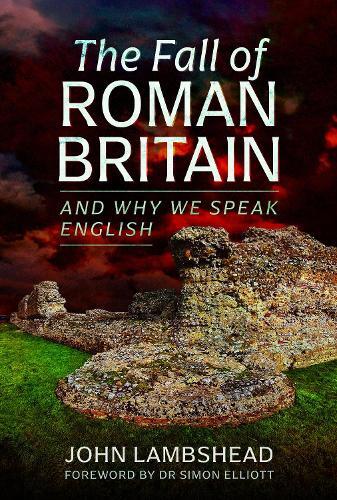
The different approaches - scientific, historical, linguistic - merge and blend as succinctly in the text as they did in the evolution of culture from Brythonic, through Roman, and into Saxon. The distinct and maintained differences between cultures was fascinating to read about. This book is clearly well-researched, and the author supports every theory he puts forward. I appreciate too that he makes the point all these theories are just best-fit conjecture.
I loved the layout of the book, like a series of essays each with their own argument to establish and conclusion to reach. This prevented an overwhelming presentation of facts, but managed each subtopic as a self-contained and effectively structured assignment. The ultimate conclusion ties up the contents of the book, leading one chapter into another.
There was obvious excitement and personal engagement with the text as Lambshead addressed the topic of Tintagel, and I would have liked to have had more of that throughout the book, but it maintained (as was probably more appropriate) a more measured explanation.
This was an intriguing book - well written and with clear presentation - which is a multidisciplinary masterpiece, addressing a fascinating and often overlooked period in British history.
Thank you to Pen & Sword Books for providing me with a review copy!
You can get a copy of The Fall of Roman Britain via Pen & Sword, or on Amazon.

September 7, 2022
#HistFicThursdays - The Eisenhower Chronicles - M.B. Zucker - Book Excerpt

This week for #HistFicThursdays, I'm delighted to once again be teaming up with The Coffee Pot Book Club! Today I'm sharing an excerpt from the brilliant book, The Eisenhower Chronicles by M.B. Zucker!
So let's begin by meeting the book...
In 1938 he was a lieutenant colonel stationed in the Philippines; by 1945 the world proclaimed him its savior. From leading the forces of liberal democracy against history’s most evil tyrant to the presidency, Dwight D. Eisenhower fought for and kept the peace during the most dangerous era in history.
The Eisenhower Chronicles dramatizes Ike’s life, portraying his epic journey from unknown soldier to global hero as only a novel could. He is shown working with icons such as FDR, Winston Churchill, and Dr. Martin Luther King Jr., and confronting challenges like D-Day, the Little Rock Crisis, and Sputnik.
Eisenhower’s legacy is grounded in defending the world from fascism, communism, and nuclear weapons. This novel shows how he accomplished it all and takes readers into his mind and soul, grounding the history in the man who made it.
Praise for The Eisenhower Chronicles:
“An ambitious novel that illuminates the complexity of one of the great figures of the twentieth century. Ike's homespun manner concealed a remarkably skilled, at times Machiavellian, leader who guided the nation through perilous times. M.B. Zucker brings us inside Eisenhower's world as he wrestles with a series of decisions affecting the survival of free government and the fate of humanity. This is a fun, fast-paced, informative read that captures the man and his times. Highly recommended.”
-Stephen F. Knott, Professor of National Security at the Naval War College and author of Washington and Hamilton: The Alliance that Forged America
“A most important aspect of M. B. Zucker's The Eisenhower Chronicles is that it dispels at least two myths about Ike's presidency: that it was but an appendage to his illustrious military career; and, that Eisenhower was more prone to react to events rather than shape them. In a lively and innovative style, Zucker shows his readers how Ike managed the Cold War during its most dangerous period and helped make his country a more fair and just society at home. A must read for anyone interested in mid-20th century America.”
-Alvin S. Felzenberg, presidential historian and author of The Leaders We Deserved and a Few We Didn't
“Zucker's achievement is monumental. In a fast-paced narrative, he captures Dwight D. Eisenhower with mastery and precision-his thoughts, emotions, decisions, and actions. The smooth prose and rich detail put the reader right there with Ike at every step of his military career and presidency, with an accurate and compelling rendering. This is historical fiction at its best.”
-Yanek Mieczkowski, presidential historian and author of Eisenhower's Sputnik Moment: The Race for Space and World Prestige
“This is a vast and minutely detailed account of Eisenhower as both supreme Warlord and President of the United States at a time of truly massive transformation.It is magisterial in its informed account and sweeping in its scope. It is a panoramic study, intensively researched, of Eisenhower as both a private person and a world figure.... Five stars and highly recommended.”
- The Historical Fiction Company Editorial Reviews
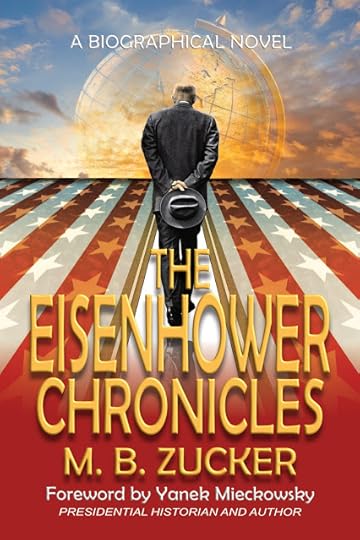
And here's an excerpt to whet your appetite:
It is early 1942. America has entered WWII following the attack on Pearl Harbor, and Ike has become a protege to Army Chief of Staff George Marshall. He is in charge of the War Department's War Plans Division. He contemplates the state of the war and discusses an interesting proposal for the first time...
Ike concentrated on a logic tree of wartime priorities he was drawing for the Combined Chiefs while hunched over his office desk. The fall of Britain, or Russia, or India will give the Axis a greater industrial output than the Allies. That can’t be allowed to happen. Our industrial power is the key to victory.
He glanced at a map that hung on the wall. Ike envisioned recent events in his head, picturing the ultimate nightmare if fortune did not reverse and the Axis maintained its momentum.
The Axis currently controls about one-third of the Earth’s surface. Nazi U-boats dominate the Atlantic. We’re losing dozens and dozens of ships per month. Hundreds of thousands of tons of material. Even our sea lanes to South America are at risk of being cut off. But the situation in the Eastern Hemisphere is infinitely worse. The Nazis are poised to overrun the Soviets in the Caucasus Mountains and Rommel’s pushing back the Brits in Egypt. Those two German thrusts can link up in the Middle East and quickly overrun that region. U-boats could then cross the Red Sea and enter the Indian Ocean. The Japanese, meanwhile, are overrunning the Dutch East Indies and could push through Burma and into India. The Nazis and Japanese could then link up near the Himalaya Mountains. And that would be it. The joining of the Axis armies would mark the entire Hemisphere’s fall to totalitarianism. Russia and China will be defeated and forced to surrender. Churchill will probably get thrown out of office with a No Confidence vote and Britain will make a deal with Hitler to avoid total destruction. Before too long the Axis will turn its attention to our Hemisphere. And America, with all its might, won’t be able to resist the combined strength of the entire rest of the world, no matter what Lincoln said. Americans will lose their freedoms. Freedom of speech. Right to a fair trial. Everything. We’ll all be Hitler’s slaves. The whole world.
That’s why I don’t get what’s wrong with this country. Why wasn’t it ready? My countrymen aren’t stupid. They must have seen what was at stake when Hitler took one country after another. And how could the Navy be caught with its pants down at Pearl Harbor? Because of that Japan has conquered half of the Pacific. How are so many people messing up this badly with this much at stake? What is wrong with people? And the Navy is still messing up. And MacArthur. And…
I need to calm down. We have a lot of smart people here. They’re getting a lot of the big decisions right. Like choosing to prioritize Germany over Japan. Roosevelt, Churchill, and the Combined Chiefs were right about that. I was wrong to question them. Yes, military doctrine says to target the weaker enemy first. But in this situation, that’s Germany. The Germans have more of their firepower pinned down fighting the British and the Soviets than the Japanese do in the Pacific. And besides, defeating Japan would do nothing to help Stalin. Our top priority needs to be to keep Russia in the war. Especially when there are rumors that Stalin has been asking Hitler for peace terms. If only there was some way to relieve pressure on the Russians.
Ike looked at the map. The Allies needed to slow the Axis advance. But more importantly, they needed to destroy the German Army. The German Army was Hitler’s center of gravity. Destroying it would force Germany’s surrender. That was the only way to win the war. But how would the Allies do that? Germany ruled the continent. The Allies had no way to even reach the German Army and fight it in a capacity large enough to destroy it.
The British are fighting Rommel in Egypt, but the Afrika Korps is a fraction of the entire German Army. The Soviets are fighting a huge portion of it, but they lack our industrial power and are taking excessive casualties. We need somewhere we can engage the bulk of the German Army and defeat it. I feel like that keeps leading me back to…
Ike turned to General Clark, one of his oldest friends in the Army.
“Can I talk to you?” Ike asked.
“Of course,” Clark replied. “What is it?”
“I think I know how we’re going to win the war in Europe.”
Clark froze. He turned away from his own desk to listen to Ike. A two-star general knew how to beat Hitler?
“Let’s hear it,” Clark said.
Ike hesitated.
“I think we need to cross the English Channel and invade the coast of France.” He had goosebumps saying it out loud for the first time.
Clark’s eyebrows furrowed.
“Are you serious?”
“Yes.”
“Ike, there hasn’t been a successful cross-channel attack since William the Conqueror won the Battle of Hastings in 1066. And there’s never, in the history of warfare, been a successful attack from England and into France. What you’re talking about is without any precedence in military history. And against the toughest enemy imaginable.”
“Hear me out, Mark. When I served in Panama under Conner, he made me study the Civil War in extreme detail. Every general, every strategy. What worked and what didn’t. And you know what I learned? That Ulysses Grant was the best general we ever produced. He defeated Lee and saved the Union.”
“Which he did through brute force. Grant was a butcher.”
“No, he wasn’t. His casualties were lower than Lee’s. Grant did it by systematically destroying Lee’s Army. Not by taking Richmond, the Confederate capital. Not with some special maneuver like outflanking the Confederates. He did it through attrition. He targeted Lee’s Army, like Clausewitz wrote about in On War, and he destroyed it. That forced Lee’s surrender at Appomattox. There’s no special button we can press to defeat the Third Reich. I want us to do to Hitler what Grant did to Lee.”
“And we’d have to invade France to do that?”
“It’s the only land area large enough to engage the German Army on a large scale and defeat it decisively.”
“North Africa’s obviously not large enough. And there’s not enough of the German Army there to fight. What about the Russian front? We could put forces there and help Stalin defeat the German Army there.”
“Our lines of approach would be too long.”
“We could go through Murmansk from the north or from the Persian Gulf via the Cape of Good Hope from the south. We’re already sending the Russians war material that way.”
“I don’t think we could send millions of soldiers as well. Besides, I don’t see Roosevelt and Marshall wanting to rely on Stalin that much. I see them agreeing to a cross-channel attack before they’d ever make that deal with Stalin.”
“What about going through Norway?”
“It’s not large enough for the type of ground campaign we’d need to defeat the German Army.”
“Portugal? Spain? We wouldn’t have to go through the Atlantic Wall.”
“Maybe. But France is closer to Germany, so it would be closer to the heart of Hitler’s empire and engage the German Army faster. Plus, it wouldn’t pull Franco into the war.”
Clark nodded, persuaded.
“What timeline are you thinking?”
“If Roosevelt, Churchill, and the Combined Chiefs get on board with this now, we can invade France by early next year. The Brits would have to take the lead, since we’d still be building up our military.”
“Did you think of this just now?”
“I actually thought of it last September. But the more I think about grand strategy, the more I’m convinced that that’s the only way to beat Hitler.”
It’s strange. I’ve spent every day thinking about Hitler since November 1938. How he’s putting his own selfish interests over his duty to humanity, the threat he poses, how to stop him, how to defeat him. But he’s never heard of me. Doesn’t know I exist. Life is odd.
You can buy The Eisenhower Chronicles from Amazon UK - Amazon US - Amazon CA - Amazon AU - Barnes & Noble - Waterstones - Kobo
Now, let's meet the author:
 M. B. Zucker has been interested in storytelling for as long as he can remember. He discovered his love of history at fifteen and studied Dwight Eisenhower for over ten years. Mr. Zucker earned his B.A. at Occidental College and his J.D. at Case Western Reserve University School of Law. He lives in Virginia with his wife.
M. B. Zucker has been interested in storytelling for as long as he can remember. He discovered his love of history at fifteen and studied Dwight Eisenhower for over ten years. Mr. Zucker earned his B.A. at Occidental College and his J.D. at Case Western Reserve University School of Law. He lives in Virginia with his wife.You can find M.B. Zucker on this links:Website - Twitter - Facebook - Amazon - Goodreads
To follow the rest of The Eisenhower Chronicles tour, click on the banner below:

August 31, 2022
#HistFicThursdays - Guest Post - Brenda W. Clough - Make it Believable: Slang in Historical Fiction
It is #HistFicThursdays once again, and today I'm delighted to be sharing a guest post from Brenda W. Clough, in which she explores the creation of believable speech and the power of slang!
My great power in historical fiction, the thing reviewers praise me for, is making my characters sound genuinely historical. You would never mistake the people in my novels for the folks in Bridgerton or Dakota Jackson movies. I make them think and talk and react like they were born in 1819, not 2009.
The trick to this, as you might expect, is research. You can find out how people talked when Victoria was queen. The great charm of the 19th century for the novelist is that there is so much material! Newspaper archives, paintings, periodicals on line, books, massive memoirs and biographies of the main players of the period – you could research forever, and never come around to writing your novel.
But be careful to consult the right sources. Google, for example is unreliable. Those sites ‘Twelve Victorian Profanities We’d Like to See Come Back’ are, alas, worthless. We know about the new Hollywood trend to update classic novels with modern slang. Even other historical novels are suspect. Georgette Heyer’s Regency romances are addictive, but if you insist on borrowing, you should double-check all her catchy period slang. Some of it is genuine, and for some of it she exerted authorial privilege, and made it up out of whole cloth.
Instead I draw your attention to novels and nonfiction written during your period. If you’re working in any era of the past 300 years or so, there’s plenty of material: newspapers, magazines, letters, sermons, political satire. For my Victorian and Edwardian fiction I amass period phrases the way some people collect beads or yarn, a hoard of them.
Slang, particularly, is solid gold. It’s easy to find serious and boring prose, but slang has personality. The people that you listen to don’t talk like church deacons or politicians addressing a meeting. Their speech is snappy!
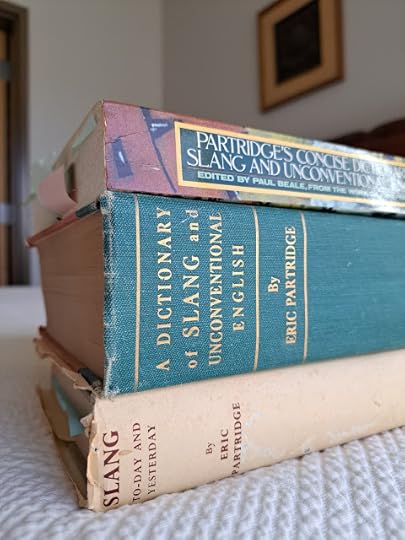
There are some good dictionaries of slang on line, like this: https://greensdictofslang.com/ Also pictured here are the three of Eric Partridge’s Dictionaries of Slang I've consulted over the years. Notice the lavish use of Post-It notes, to mark the especially good phrases. You can give yourself some elbow room with these kinds of resources, because the verbal use of a term probably precedes its recording on paper by many years. Partridge’s has the phrase ‘fuck an old rat’ listed as 1920s or so. But it was too vivid not to put into the mouth of my Edwardian science fiction hero Titus Oates, a historical man and a famously profane explorer who died with Robert Falcon Scott in Antarctica in 1912.
Dictionaries only carry you so far. You have the word, but how was it used in a sentence? Finding it in use is the way to go. Fortunately some of the masters of slang and dialogue were operating in my period. Charles Dickens is inimitable in more ways than one. Under the pen name ‘Boz’ he wrote extensively about London and its denizens, and from him I stole terms like ‘up to the time of day’ and ‘familiar with a move or two.’ i.e. not an innocent from the country. Dickens surely knew all the dirty words, but since he was writing for a magazine he was careful to use, or invent, bowdlerisms and catch phrases. His readers knew exactly what he meant when Dickens described a young woman as up to the time of day.
Then there are the words and terms that even Dickens could never write down: curse words, profane exclamations, invective, sexual terminology. People were far more conservative about this kind of thing when the writer knew the work would be read by many people. Even letters sent home from India or Antarctica were expected to be read aloud by the home fireside. Were you going to mention your adventures with Calcutta prostitutes if Aunt Lucinda and Granny were seeing that letter?
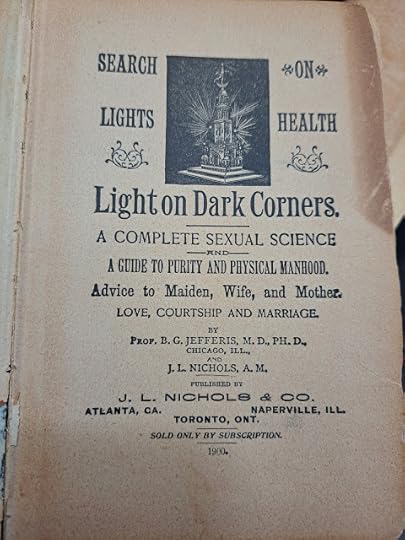
For X and R-rated terminology the author might scout out marriage manuals and ‘family’ books, written for conscientious mothers to hand to the bride or groom just before the wedding. For that sort of material I resort to LIGHT ON DARK CORNERS: A Complete Sexual Science. A Guide to Purity and Physical Manhood. Advice to Maiden, Wife and Mother, Love Courtship and Marriage. Is that a title or is that a title? Similar instructional works enjoyed a brisk sale in the days before you could learn all about sex on YouTube. My copy is battered and falling apart, clearly read and re-read. I got it as a present, but since it was published in 1900 it’s in the public domain and available for free on Project Gutenberg: https://www.gutenberg.org/ebooks/23609
This book is so magnificently period that it’s nearly unreadable, formatted in numbered paragraphs so that you can cite the text by chapter and verse. It’s a ragbag of disorganized tips and advice. I estimate that a full third of the text is devoted to denunciations of masturbation. And there are startling treatments for diseases. Did you know that consumption can be cured with hot water? I wonder if it would work with Covid?
Nobody read this manuscript before it went to press, or if they did nobody cared enough to fix anything. The inconsistencies inherent in the work from page to page are neck-snappingly sharp. We all know, right? That beauty in woman is meaningless. It is her inner soul that should be lovely! Here are some complexion tips and ideas on how to improve your hair. No, a girl should only marry for love. Next up, a long numbered list of things she should consider when a fellow shows interest in her. These include his height, his income, how he treats his mother, his teeth, and the shape of his skull. (Flat heads, bad!)
I could mine this book for vocabulary and ways of thought forever. Consider this magisterial assurance about prenuptial discussions, addressed to the young lady: “You can have no more certain assurance that you are to be victimized, your soul and body offered up, slain, on the altar of his sensualism, than his unwillingness to converse with you on subjects so vital to your happiness.” I immediately lifted ‘slain on the altar of his sensualism’ and put it into my novel. How could anyone resist?
August 30, 2022
Book Review: Marlon and the Scary Something


Review
I should begin this review by apologising to Dan Bailes, the author. I had promised to review Marlon's most recent adventure months ago but, after a very busy three or four months, I'm only just getting round to it.
But I am so pleased I did eventually get round to reading Marlon and the Scary Something. It is a charming book, and one which deals with issues of anxiety and fear in childhood in a way that rarely strays into being heavy-handed.
The story follows Marlon, a cat who certainly feels like he's got the cream! He's just lounging around and winding up his brother when suddenly a dog appears! He doesn't even know what a dog is at this point - he just knows that this new arrival makes him feel afraid.
Over the course of the book, Marlon realises that the best thing to do is to face his fear and, eventually, it all ends very well.
This is a personal book for the author, who explains in the afterword that he experienced anxiety as a child. This really shows - I would highly recommend this book to anyone who would like to discuss fear and anxiety with their child.
Marlon's story would have been an absolute 5* for me, but I just wasn't as convinced by the little bits with the children and their parent discussing the story. By contrast, Marlon is a charming little guy, and his newfound fear (or friend?!) is written brilliantly too.
There aren't very many illustrations but, where there are, the style is really lovely.
I'm looking forward to taking this book into school - I can already think of one or two pupils who will really enjoy and benefit from this book.
In summary, a lovely story which will invite your little ones to start talking about any fears and anxieties.
Blurb
When Marlon stumbles into the Scary Something he freezes, stares at the creature and scurries home to safety. Why is the creature there? What does it want? And why is Marlon so scared? Oh no! Marlon's caught in a web of worry. He's nervous, anxious and frets about the creature all day. That Scary Something has Marlon stuck on a Creature-Feature-Merry-Go-Round. What can he do? Anxiety is thief! It's stealing Marlon's joy! Can he break free and stop being afraid? Can he learn how to believe in himself, quiet his anxieties and face his fears?
It’s Book 2 of Marlon’s Marvelous Adventures!A cozy cat adventure, perfect for kids 6-9 and cat lovers everywhere! Dog lovers too!
You can find the book on Amazon
Social Connections
Website: https://nicedogbooks.com
August 25, 2022
Book Review - Roman Britain's Pirate King - Simon Elliott
After reading Alexander the Great versus Julius Caesar, I knew I liked the way Simon Elliott writes - something which is even more important in nonfiction than fiction. Roman Britain's Pirate King focuses on a period in the Roman Empire which I have got to know rather well through my own research, but my research had all been in the east of the empire. I couldn't wait to dive into this book as it explored events in the west!
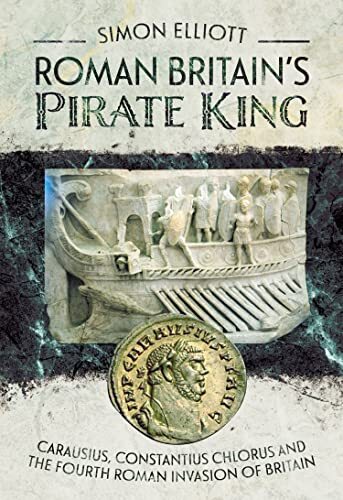
The book divides into two parts: the first half is scene-setting, taking the reader through a step-by-step explanation of the situations leading up to the usurpers' actions; the second half looks at the events surrounding Carausius and Allectus. I have to admit, this hadn't been exactly the ratio I'd expected. Out of 166 pages, our protagonist only has 46 pages between his birth and death.
But the book is a fascinating look at the legacy of the events in those ten years when Britain became a bargaining chip for control of "the imperial power". There is a thorough and broad look at both primary and secondary texts, while Elliott also puts forward theories and interpretations of his own, making this book the newest step on discovering the shrouded truths of this difficult and largely ignored chapter of the Roman Empire's history.
This is clearly a time and topic close to the author's heart, referencing his own PhD as a recurring source, while the narrative in the second half of the book is driven by a great enthusiasm. In essence, the story of Carausius is all about money. First he was accused of not handing over his booty, then of instigating his interception of the pirates. Finally, the most resounding legacy of all is set, not in stone, but in gold, silver, and copper, with the hugely significant establishing of the first British Mint (that's coins, not humbugs!). The sixteen pages of coloured plates help to visually bring to life the past detailed in the book.
On a personal - and more than a little speculative - level, I can't help but question whether Carausius was set up by Maximian, an idea Elliot explores a little in his assessment of the heavily biased contemporary commentaries. It plays out as a classic case of deputy-outshines-leader, with Carausius usurping as the lesser of two evils compared to his sentence of death issued by Maximian.
In all, this is a thoroughly readable look at the Roman Empire's turbulent years, climaxing with the decade of the double usurpation of Carausius and Allectus, and its resounding impact on the future of the empire.
Thank you to Pen & Sword Books for providing me with a review copy!
You can get a copy of Roman Britain's Pirate King via Pen & Sword, or on Amazon.

#HistFicThursdays - Horrible Histories 8 - Dick Turpin
Going down to visit my grandma in Lincolnshire from our Orkney home was always an adventure. We did it most years, sometimes by train, sometimes by car. This might seem an odd way to open a blog about Dick Turpin, as we were the best part of 300 years too late to be stopped by highwaymen, but there is a reason! It's strange the sort of things our memories are built on. I can still remember the stuffy smell of the veranda, and the rows of bun boxes in the pantry (and yes, from time to time I might have sneakily helped myself to the tubs of sugar-strand toppings). And I also remember a decorative plate she had on the wall in the Living Room. It was of a cloaked man, hiding behind a bush as a stagecoach travelled towards him (see, I told you there was a reason!). At the bottom, it had a line from John Gay's poem "A Journey to Exeter":
Where broken gamesters oft repair their loss
In the poem, the travellers are not journeying by coach, but riding. This would have bettered their chances had those "broken gamesters" appeared, but they were never stopped as they crossed Bagstot Heath.
It's a strange thing how highwaymen have been portrayed in fiction and arts. They are often romantic figures who, if not morally right, are at least relatable. William Harrison Ainsworth's Rockwood, is responsible for most of the misconceptions about Dick Turpin, but there is an entire subgenre built on the - usually uncharacteristically heroic - antics of highwaymen.
Dick Turpin himself was not a trendsetter, his robberies arrived in the middle of that "golden age" of highwaymen, which is broadly thought to last from 1650-1800 (the first official reference to "highwaymen" being made in 1617, and the last man - Robert Snooks - to be executed as a highwayman in 1802). He only killed two men in his entire career, far fewer than others, and he lived the first 25 of his 30 years as an ordinary person, no antics, no trouble. He married a woman from his local area when he was about 20 but, as far as is known, they had no children.
Perhaps the saddest thing of all was that he appears to have stumbled into a life of crime rather than set out for it. His initial role in the "notorious gang of Gregory" had nothing to do with guns or robberies, but processing the meat from the deer they had poached. It takes a strong-minded person to withdraw from a group like that and one thing Turpin was certainly not, was strong-minded. Instead, perhaps tantalised by the promise of riches or the the adrenaline of the actions, he began to partake in the gang's more criminal actions. By the time he was 29, Turpin was a fully inducted member of the group, breaking into houses and taking off with hundreds (which relates to thousands today) of pounds worth of goods.
The Gregory brothers were caught and executed along with most of their gang in the first half of 1736, but Dick Turpin was not among them. Since they were given over to the law by one of their accomplices, John Wheeler, it would seem that Turpin was either not as much of a key figure as we are led to believe, or Wheeler had built a strong enough relationship with him to spare Turpin in his confession.
Being identified after committing a handful of highway robberies at around the same time, Dick Turpin dropped off the radar for for the best part of eight months. When he returned in 1737, he teamed up with other highwaymen, one of whom was his "good mate, Matt King". This partnership, however strong, was short-lived. According to Richard Bayes (who went on to write a biography of Turpin), Dick Turpin accidentally shot Matthew King while trying to hit Bayes. This had a profound effect on Turpin who, up to this point, does not appear to have killed anyone. Matthew King died about a week later, and Dick Turpin had already gone into hiding.
The floodgates were now open, and Dick Turpin was becoming the monster of legend. A price was set on his head, and he killed at least one of the people who tried to capture him. Desperate to begin again, he traveled to the relative obscurity of Yorkshire, rebranded himself as a trader, and renamed himself as John Palmer. For more than a year, he was absorbed back into society. Ironically, it was the shooting of a cockfighting bird which ultimately led to Dick Turpin's downfall. His refusal to pay any money to the court led to further and further investigations. It was the "postie" who claimed the reward for him, as the song says, but in another tragic twist of the knife, this had been because his sister's husband had refused to pay for his letter.
His entire life, as it swung between highs and lows, goods and bads, appears to have been governed not by himself but by the company he kept. In this time of alternative history stories, I'd love to think about what would have happened to Richard Turpin if he had plucked up the courage to say that initial "no" to the Gregory Gang. But perhaps this is not a new idea at all. After all, from as early as the nineteenth century, Dick Turpin had risen from his role as a monster in the legend, to a romantic figure. Now, he was doing daring deeds for a cause. The fact is, none of us like to think about people manipulating others, but this was exactly what the real story of Dick Turpin showed to have happened.
I suppose the love of highwaymen should not be surprising. I know I have a tendency to go for those characters in books - both as a reader and a writer - who are a little bit shady but turn out to be good underneath. The real Dick Turpin may not have been like that, but his story since has certainly portrayed him so.
August 17, 2022
#HistFicThursdays - Guest Post - Karen Heenan - The Inspiration Behind Songbird
Today's #HistFicThursdays post comes from another fabulous member of the Historical Writers Forum, Karen Heenan. Welcome to the world of Songbird her fantastic Tudor book. Here's how it all began...
The Inspiration Behind Songbird
(and The Tudor Court Series)
 Henry VIII, by Hans Holbein
Henry VIII, by Hans HolbeinI discovered the Tudors at a young age. My mom was watching the BBC’s Six Wives of Henry VIII (the 1970 series, which the US got in 1972) and I ended up getting sucked into the program. Mom only wanted to watch through the Anne Boleyn episode, because she always had sympathy for the “other woman” in stories, but I insisted, at the age of seven, that we watch the whole thing.
And that was it. Tudors for life.
Although I’d always written, it never occurred to me to write historical fiction, much less in the era I was most passionate about. This was possibly because there were so many books about Henry and Anne and the rest that I didn’t feel I had anything new to say on the topic. It also didn’t occur to me to look at Henry’s court from another perspective.
The book that started me on the journey to Songbird was Carrolly Erickson’s Great Harry. Erickson went on to write fiction about the Tudor period, but at the time she’d only written non-fiction. It read like fiction, though—fast-paced, interesting, and full of facts that set my brain on fire, like this one:
“When Henry bought children, as he did in December of 1516, paying a stranger forty pounds for a child, it is tempting to think that he purchased them for their musical gifts.”
[Carrolly Erickson, Great Harry, ch. 14. Quoted source: Letters and Papers, Foreign and Domestic, of the Reign of Henry VIII. ]
Dropped tantalizingly into a discussion of Henry’s love of music and the children of the Chapel Royal, that sentence wouldn’t leave me alone. I finished reading and went on to other things, but it nagged at me. Forty pounds was an unimaginable amount of money for an ordinary person in 1516. You would have to need money very badly, I thought, to sell a child who had survived to an age where they might be of help to you and your family.
What would it be like, to be sold to the king? Would you feel better about having been sold, knowing that you brought security to the family you might never see again? And who would you be, if you were no longer a member of that family? How would you know where you belonged—who to love—who to trust—when that is your past?
Further research told me that royal choristers were exclusively male. I wanted to write about a girl, so I made her a member of the King’s Music—Henry’s private minstrels, who traveled with him and performed at his beck and call—although I kept the date of December, 1516, and the purchase price, which would be over $50,000 in 2021 dollars. [Nye, Eric W., Pounds Sterling to Dollars: Historical Conversion of Currency, https://www.uwyo.numimage/currency.htm ]
I took my girl, just before her tenth birthday, and dropped her into an unfamiliar world, with no one to rely upon but herself, and the voice that made the king buy her in the first place. Found family is one of my favorite themes, and Bess surrounded herself with people she loved, always suspecting that her real family wasn’t that sorry to see her go. Because of the vagaries of sixteenth century life and evil author intent, she doesn’t get to keep all that found family, which just adds to her inability to trust the world to keep her safe.
 Minstrels at Hever Castle, Nikki PiggottThere’s also guilt. Once she’d been at court for a little while, warm and properly fed for the first time in her life, able to sing as much as she wants, Bess realized she was happy. She doesn’t want to go back to cold and hunger and being punished for wasting time with music. That’s not an easy realization for anyone, much less a child.
Minstrels at Hever Castle, Nikki PiggottThere’s also guilt. Once she’d been at court for a little while, warm and properly fed for the first time in her life, able to sing as much as she wants, Bess realized she was happy. She doesn’t want to go back to cold and hunger and being punished for wasting time with music. That’s not an easy realization for anyone, much less a child.She grows up in the court system, progressing from the child singer who Henry calls his “songbird” to a valued member of the royal minstrels, being in the background of the tapestry of the early Tudor Court and all its excitements and intrigues.
But the question always remains: Who can you trust when the people who are supposed to love you are willing to give you up?
That, for me, is the best part of research: when you stumble upon something that hooks you, and won’t let you go until you’ve turned it into a book. And then another. And another.
You can find Karen's books here: Songbird - A Wider World - Lady, in Waiting- Tudor Court Omnibus (all 3 books, bonus content)
Now let's meet the author!

 As an only child, Karen Heenan learned young that boredom was the ultimate enemy. Since discovering books, she has rarely been without one in her hand and several more in her head. Her first series, The Tudor Court, stemmed from a lifelong interest in British history, but she's now turned her gaze closer to home and is writing stories set in her hometown of Philadelphia.
As an only child, Karen Heenan learned young that boredom was the ultimate enemy. Since discovering books, she has rarely been without one in her hand and several more in her head. Her first series, The Tudor Court, stemmed from a lifelong interest in British history, but she's now turned her gaze closer to home and is writing stories set in her hometown of Philadelphia.Karen lives in Lansdowne, PA, just outside Philadelphia, where she grows much of her own food and makes her own clothes. She is accompanied on her quest for self-sufficiency by a very patient husband and an ever-changing number of cats.
One constant: she is always writing her next book.
Keep up with Karen via: Website - Facebook - Twitter - Instagram - Books2ReadAugust 16, 2022
Book Review: A Paraphrase of "Paradise Lost" For Youngsters
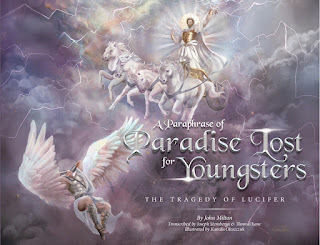
Blurb:
This retelling of books V and VI of the epic poem Paradise Lost, written by John Milton, follows the story of Satan's rebellion and fall from grace. The Father announces his heir, Satan rebels, Abdiel tries to reason with the fallen angels, followed by a war scarring Heaven's landscape. Brother against brother, the rebellious few against their Father, a family torn apart by war, concluded by the victor, the Father's chosen Son, casting the disobedient out of paradise.
Excerpt:
At God’s declaration of war, dark clouds covered all of Heaven and smoke began to roll down the sacred hill. Then the countless hosts of Heaven marched on the enemy, fully armed from head to toe with helmets, spears, and shields.
Satan gathered together his army as well. He stood on his chariot, bright as the Sun, surrounded by his fiery angels with their golden shields, and marched toward the throne of God.
He hoped that if he moved swiftly enough, he could reach the throne unopposed. Michael’s army dashed his hope very quickly. Before the armies clashed, Satan dismounted from his chariot and met with Abdiel on the battlefield.
Satan taunted him, “I see you have decided to bend your knee to the new Lord of Heaven. Tell me, Abdiel: is it your laziness that led you to accept eternal servitude?”
Abdiel was unfazed and responded sternly, “Better to serve in Heaven than rule in Hell!” With that, Abdiel threw a single strike on Satan’s helmet so lightly as to be done in mockery. It was so unexpected that it knocked Satan back ten steps before he had to bend to one knee to stop himself from losing balance and falling over. Both armies watched in disbelief. The rebels became filled with rage and the saints were filled with joy, and then Michael sounded the trumpet for his army to march.
Review:

I was very excited by the premise of "A Paraphrase of Paradise Lost For Youngsters" as I have never made it through the original. In fact, Milton is a poet I could name but would have to put my hand up and say that I've never really read any of his poems. Is this a really bad admission? I'm also always excited at the possiblity of introducing my pupils to the classics.
As a result, I was pleased to read this book which brought the story to a new audience. It felt that it was perfectly pitched for me: rewritten in an accessible and twenty-first century style, with illustrations which support the work brilliantly.
My only quibble with this is that I'm a 32-year-old teacher, writer and publisher. I don't actually think this book is for youngsters at all - it's a very good retelling of the story and I wish I had it in hardback to fully enjoy those illustrations (never quite the same on an ebook!) but it's not one I would take into school. Some of the language choices aren't geared towards youngsters.
If this book was marketed as being a retelling of the story and not specifically for youngsters, I would have awarded it four stars. I can highly recommend it to adults like me who want to know what this story is all about and read it in an accessible way.
In short, a great retelling of a fascinating story with engaging illustrations.
Meet the Authors:
From a large Croatian family, Joseph Stemberga grew up with three sisters, a father, and a mother.
He studied theology at Concordia University, earning both a bachelor’s and a master’s degree, as well as a bachelor’s degree in history and religions.
Inspired by a transcription of Dante’s Divine Comedy for a younger target audience, he contemplated and discovered that no such equivalent existed for another epic poem, Paradise Lost.
Thus, the work began . . .
Thomas Lane was inspired to work on the project in the same way the Irish monks copied and recopied older manuscripts to keep them from disappearing during the Dark Ages. Just as these monks never signed a single manuscript with their names, Lane prefers to use a pen name to honour their legacy and bring a classic work to life for its own sake.
Kamila Oleszczuk has been drawing since the age of three, but contrary to most children, she never stopped. Her passion for art and animation fuelled her desire to create. Beyond the years of drawing throughout her childhood, she went on to learn more about different art mediums and forms by studying film animation at Concordia University. Kamila has been focusing mainly on children’s illustrations ever since.
WEBSITE - www.paradiselostkids.com
FACEBOOK - https://www.facebook.com/Authors-Jose...
INSTAGRAM - @paradiselostkids
TWITTER - @paradiselostkid
Where to buy the book:
Giveaway!
Joseph Stemberga and Thomas Lane will be awarding a $15 Amazon or Barnes and Noble GC to a randomly drawn winner via rafflecopter during the tour. Enter here!
Crowvus Book Blog
- Virginia Crow's profile
- 128 followers



